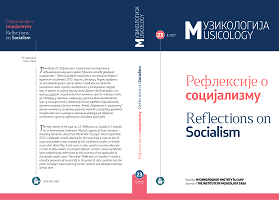The Non-Aligned Humanism of Rudolf Bruči: The Composer And The Society of Self-Management Socialism
The Non-Aligned Humanism of Rudolf Bruči: The Composer And The Society of Self-Management Socialism
Author(s): Nemanja SovtićSubject(s): Cultural history, Music, Social history, Sociology of Art
Published by: Muzikološki institut SANU
Keywords: Rudolf Bruči; self-management; non-alignment; humanism; East; West;
Summary/Abstract: In 1979 the oratorio We Are All a Single Party was performed, composed by the Yugoslav composer Rudolf Bruči, who in an interview for the Novi Sad daily newspaper Dnevnik explained his driving motives in the following way: “I wanted to preserve the spirit of our revolutionary songs and to speak in a modern, familiar way, understandable to everyone, about the decades in which our revolution was born and grew; about the legendary activities of pre-war communists, the difcult days of the War of National Liberation, the liberation and reconstruction of the country, about Tito and his invaluable contribution to the development of our selfmanagement socialism and non-aligned humanism” (Dnevnik, 10 April, 1979). In this article I argue that the syntagm “non-aligned humanism” is suitable for identifying the connection between the aesthetic and the political in Rudolf Bruči’s creative output, observed as a consistent author’s opus. At the core of this thesis lies the assumption that non-alignment in regard to the West or East was a major political and aesthetic orientation of Yugoslav self-management socialism. The intersubjective feld of this self-management socialist pluralism produced creative entities – composers such as Bruči – whose works were created under the principles of direct political engagement and modernist aestheticism as diferent manifestations of the same ideology. Within the specifc rationality of non-aligned humanism, the concrete poetic-morphological characteristics of Bruči’s compositions become coherent subjective (Bruči’s personal) and objective (social) achievements.
Journal: Muzikologija
- Issue Year: 2/2017
- Issue No: 23
- Page Range: 83-97
- Page Count: 15
- Language: English

